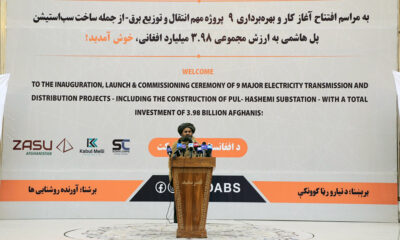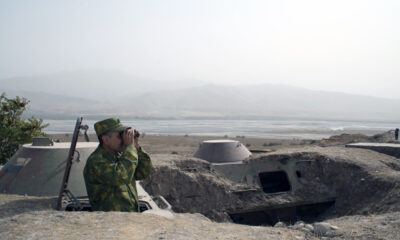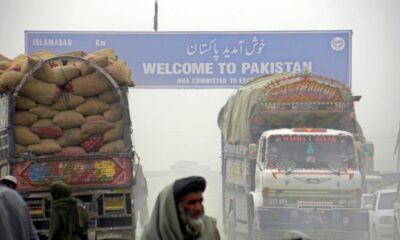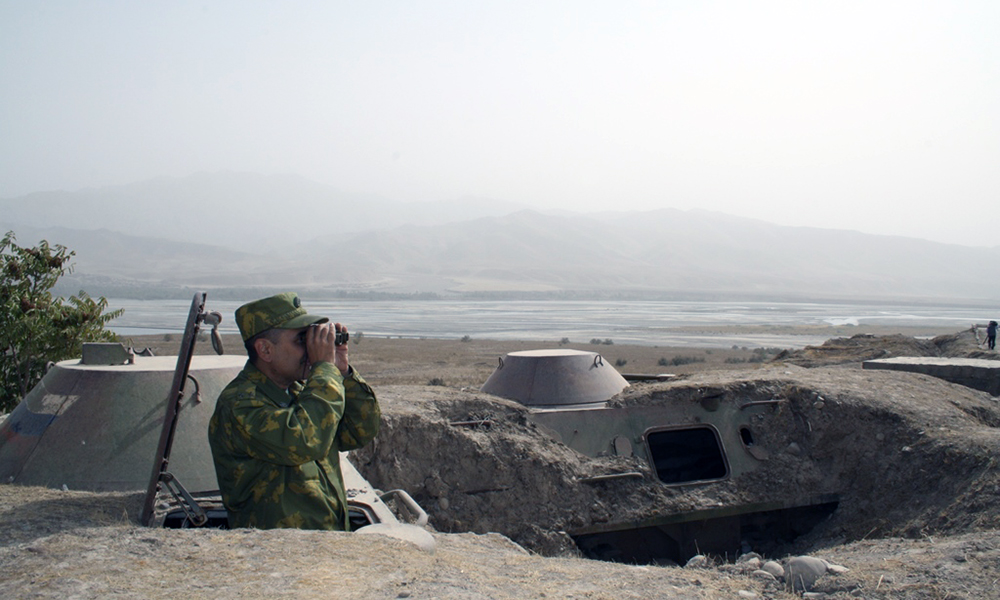Latest News
UNAMA chief delivers stark report to UN Security Council
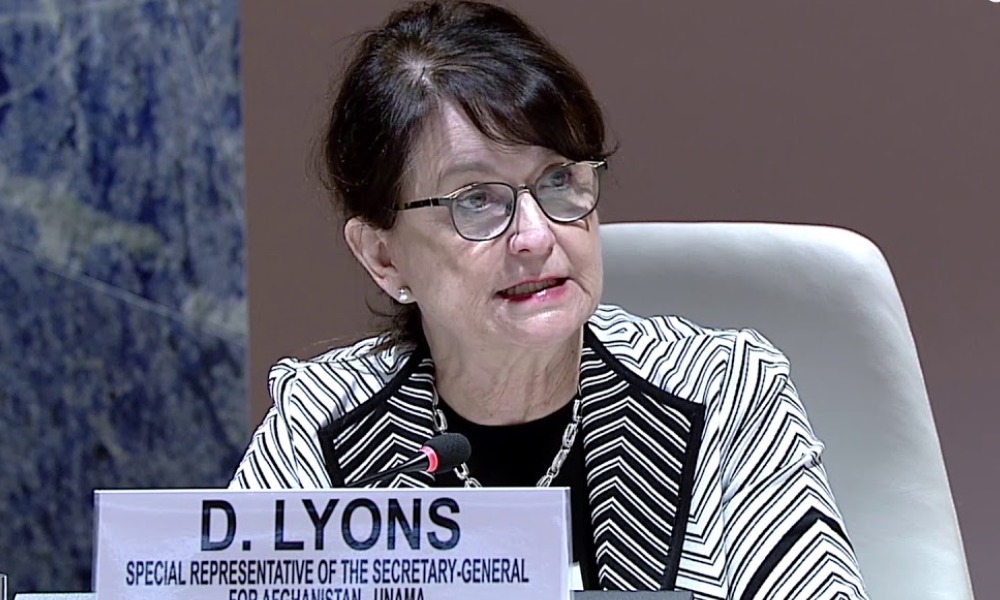
United Nations Assistance Mission in Afghanistan (UNAMA) chief Deborah Lyons sounded the alarm on Tuesday when she told the UN Security Council that soaring rates of violence continue to hamper humanitarian efforts in the country.
She said that six months into Afghanistan’s latest round of peace talks, progress remains slow and demands strong support from the global community.
“We always knew that this would be a complicated peace,” said Deborah Lyons, as she briefed the 15-member Council during a videoconference meeting.
Describing Tuesday’s meeting as a chance to take stock six months after the launch of the Afghanistan Peace Negotiations, the signing of an agreement between the United States and the Taliban and a joint declaration between Kabul and Washington, D.C., she said attacks against civilians have only escalated.
The extreme violence is leading both Afghans and their international partners to voice understandable frustration. “The killings, the displacement, the suffering of the Afghan people must end now,” she stressed.
Noting that the first two months of 2021 saw a worrying spate of brutal attacks deliberately targeting civilians. She said the deaths of more than 80 Afghans — including media staff, civil society, members of the judiciary, religious scholars and government officials — have been recorded to date.
“This does not convey the full, crippling impact of the violence on Afghanistan’s civic life,” she said, adding that for every Afghan killed, many more leave their professions or plan to flee the country.
She also stated that ISIS-K (Daesh) claimed responsibility for 25 violent attacks in the last quarter, a steep increase, and she highlighted a deepening humanitarian crisis and the threat of drought. Food insecurity is at record levels, with more than 40 per cent of the population at emergency and crisis levels, she said..
Against that backdrop, she called on the international community to contribute generously to the humanitarian response plan, which is only six percent funded, while warning that money alone is not enough.
She also said humanitarian workers continue to be targeted by threats and violence, and the impartial delivery of aid is obstructed.
Emphasizing that such acts are illegal and unjustifiable, she recalled that she recently raised those issues with Taliban leaders and her office has been working with the Afghan government to ensure its legislative framework protects the space of non-governmental organizations carrying out humanitarian work.
She said all these developments are taking place against the backdrop of slowing progress in the peace talks in Doha. She said both sides need to continue to show their commitment to remaining at the negotiating table.
Welcoming the appointment of Jean Arnault of France as the Secretary-General’s new Personal Envoy on Afghanistan and Regional Issues, she said Member States have also played a vital role in coming up with new initiatives to reinvigorate the peace process.
Pointing to a proposed meeting in Turkey as another such opportunity, she stressed that such initiatives must be focused, coherent and, above all, they must reinforce rather than undermine the Doha negotiations.
According to Lyons, decades of conflict have created real grievances on all sides, as well as a deep lack of trust among the parties.
She also said there are genuine and profound differences between the Afghan Republic and the Taliban’s desired end State.
Addressing those issues will continue to require patience and commitment on both sides, she said, adding that any lasting peace settlement must consider the views and concerns of all Afghans and not just those of an elite few.
She said she hopes by her next briefing to the Security Council real progress would have been made.
Lyons stated that she hopes by June, there would have been at least a substantial de-escalation of violence, if not a ceasefire.
While those developments could mark a real turning point, the road ahead is still not clear and “we are moving into a period of great uncertainty, she said.
Shaharzad Akbar, Chairperson of the Afghan Independent Human Rights Commission, also briefed the Council, stressing that the war in Afghanistan remains one of the world’s deadliest conflicts for civilians.
She said the onslaught of attacks has further diminished the country’s civic space, leading to self-censorship for journalists, human rights defenders and religious scholars, and thus impacting the quality of public engagement and debate on issues critical to Afghanistan’s present and future.
Akbar also stated that the country’s peace talks remain dominated by a group of elite men, some of whom have themselves been responsible for perpetuating violence.
“Building peace takes more than a deal among elites,” she said, calling for a more inclusive national endeavour that ensures the participation of women, minorities, youth, civil society and the vibrant Afghan media, as well as victims.
A minimum of 30 percent of the participants in the peace talks should be women, and more steps are needed to achieve full gender balance in the future, she said.
“At the recent conference in Moscow, I, like many Afghan women, was shocked and angered to see only one Afghan woman, Dr. Habiba Sarabi, in a room full of men discussing the future of my country,” she said.
Afghan women have fought for their human rights for many decades, and have made considerable progress in education, employment and political participation. They are experts everywhere, from the fields of politics to public administration, security, business, science and information technology.
Excluding or marginalizing them from the main discussions about the future of Afghanistan is not only unjust and unacceptable, but unwise and unhelpful to a lasting peace, she said.
Latest News
Tajikistan says two soldiers killed in clash with militants near Afghan border
Business
Afghanistan’s first aluminum can factory launched in Herat with $120 million investment
Mullah Abdul Ghani Baradar, Deputy Prime Minister for Economic Affairs, laid the foundation stone of the “Pamir” aluminum can production company at the industrial parks of Herat on Thursday.

Afghanistan’s first aluminum can manufacturing plant was officially launched on Thursday in Herat province, marking a significant step toward industrial development and economic self-reliance.
Mullah Abdul Ghani Baradar, Deputy Prime Minister for Economic Affairs, laid the foundation stone of the “Pamir” aluminum can production company at the industrial parks of Herat on Thursday.
According to officials, the Pamir factory is the first of its kind in Afghanistan and is being established with an investment of $120 million. The project will be built on 16 jeribs of land within Herat’s industrial zones.
Once completed, the factory is expected to create employment opportunities for around 1,700 Afghan citizens. Officials say the project will play a key role in boosting domestic production, reducing reliance on imports, and strengthening the national economy.
Authorities described the launch of the project as a clear sign of growing investment in the industrial sector and ongoing efforts to promote economic self-sufficiency in the country.
Latest News
Medvedev: IEA posed less threat to Russia than western-backed groups
He added that such organisations have consistently pursued one objective: “to break apart the multiethnic people of Russia.”
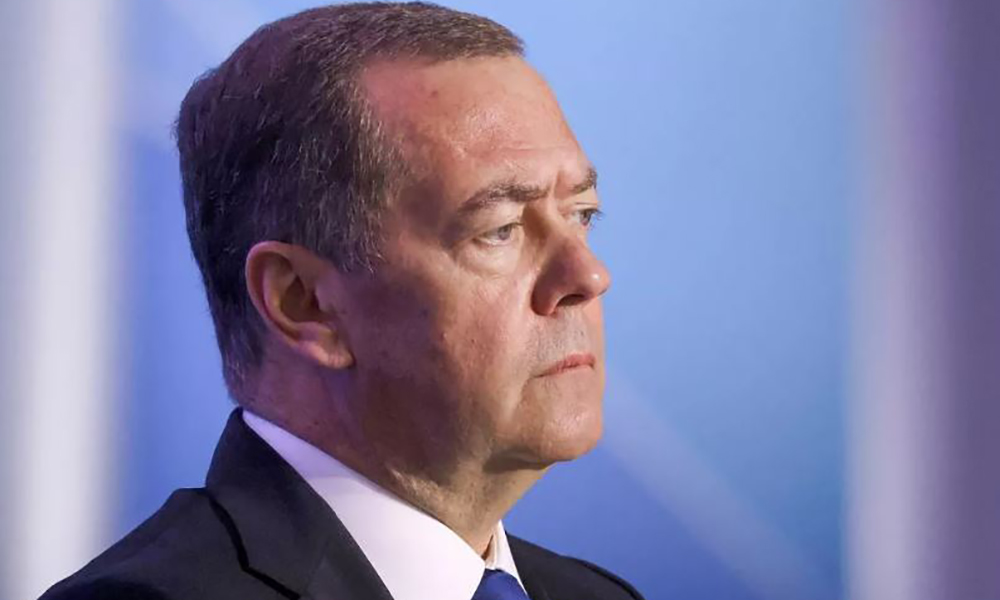
Russia’s Deputy Chairman of the Security Council, Dmitry Medvedev, has said that the Islamic Emirate of Afghanistan (IEA) caused less harm to Russia than Western-backed civic organisations that, he claims, sought to undermine the country’s unity.
In an article published in the Russian journal Rodina, Medvedev wrote that while the IEA had long been designated as a terrorist organisation, its actions did not inflict the same level of damage on Russia as what he described as Western-supported institutions operating under the banner of academic or humanitarian work.
“Let us be honest: the Taliban (IEA) movement, long listed as a terrorist organisation, has caused modern Russia far less damage than all those pseudo-scientific institutions whose aim is to dismantle our country under the guise of aiding the oppressed,” Medvedev stated.
He added that such organisations have consistently pursued one objective: “to break apart the multiethnic people of Russia.”
Medvedev’s remarks come amid a shift in Russia’s official stance toward Afghanistan. In April, Russia’s Supreme Court suspended the ban on the Islamic Emirate of Afghanistan, which had previously been included on the country’s list of terrorist organisations.
-

 Latest News2 days ago
Latest News2 days agoAfghanistan exports 10 containers of batteries to Saudi Arabia and UAE for first time
-

 Latest News2 days ago
Latest News2 days agoPakistani cleric condemns lifetime immunity for Army Chief as un-Islamic
-

 Latest News4 days ago
Latest News4 days agoAfghanistan signs 30-year deal for marble mining in Daikundi
-

 Latest News5 days ago
Latest News5 days agoAfghan health minister calls for medical cooperation between Kabul and New Delhi
-
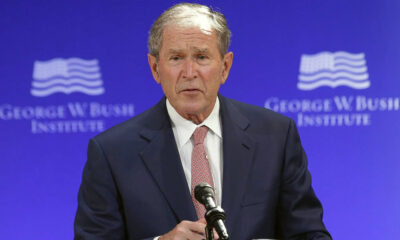
 Latest News4 days ago
Latest News4 days agoBush Institute criticizes Trump administration’s Afghan immigration freeze
-

 International Sports2 days ago
International Sports2 days agoAriana News to broadcast key AFC Champions League Two clash
-
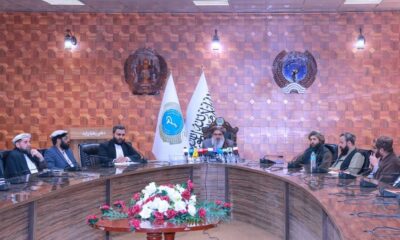
 Health2 days ago
Health2 days agoAfghan Health Minister hails India visit as new chapter in bilateral ties
-

 Regional2 days ago
Regional2 days agoPakistan agrees to $4 billion arms deal with Libyan National Army


